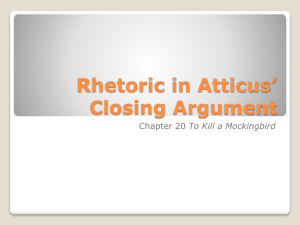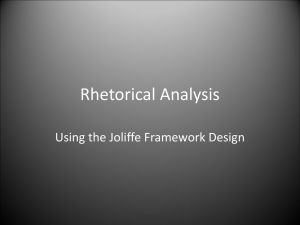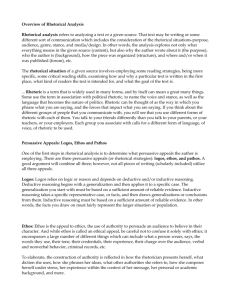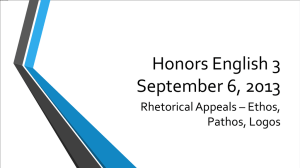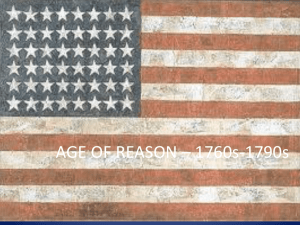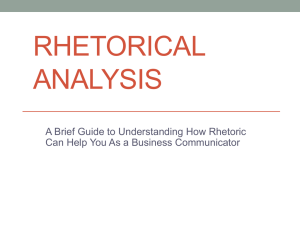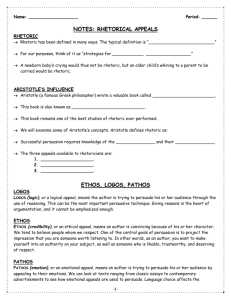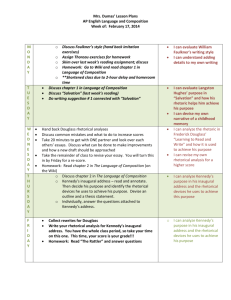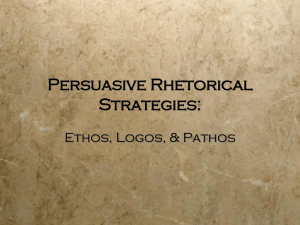Introduction to Rhetoric
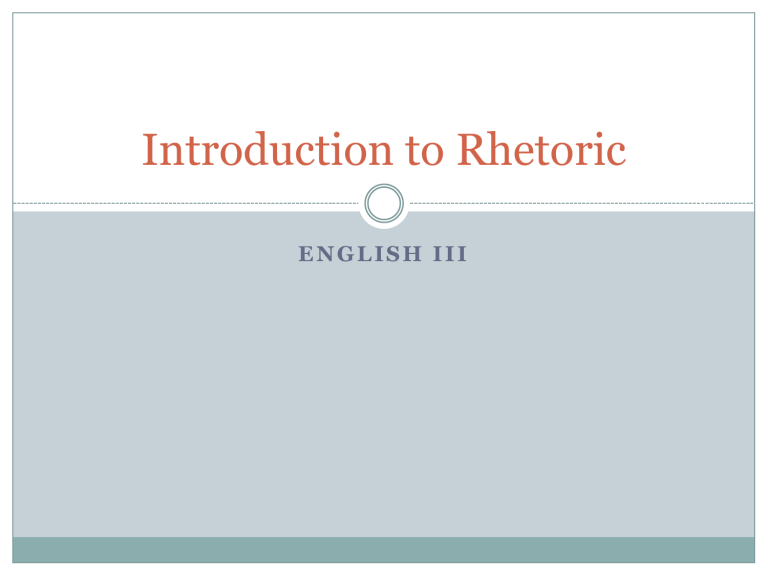
Introduction to Rhetoric
E N G L I S H I I I
What is rhetoric?
Rhetoric: the art of effective speaking or writing
Analysis: the process of separating something into its constituent elements, examining the elements, and evaluating how they work together to create the whole
Any text has three elements:
1.
2.
3.
Speaker – the person/persona delivering the message
Purpose – the topic and reason for delivering the message
Audience – the group for whom the message is intended
Rhetorical analysis is simply the analysis of the relationship(s) among the elements of a text.
It requires close reading and an understanding of how various rhetorical devices and strategies are used to create effective rhetorical appeals.
Methods for Analysis
OPTIC for visuals
OPTIC - interpreting visual text.pdf
TPCASTT for poetry
TPCASTT_Template.pdf
SOAPSToneD for annotation and analysis of any other text. Use this on a regular basis!
SOAPSToneD.pdf
The Rhetorical Triangle
LOGOS
(Message)
Appeal to logos: based on logic, facts, and truths; the truths can be universally accepted or proven facts, or may be based on ideas or concepts true for a specific group of people
(audience)
Appeal to ethos: believability of the speaker; credibility and trustworthiness
Appeal to pathos: designed to stir the emotions of the audience; language or syntax designed to make the audience more receptive to or engaged in the message
Examples in Advertising
Look at the following commercials. Identify the rhetorical context (speaker, purpose, audience) and the appeals being used (logos, ethos, pathos).
Discuss how and why the appeals are effective.
Commercial 1 http://www.youtube.com/watch?v=EJKlB_FuOTE
Commercial 2 http://www.youtube.com/watch?v=SKL254Y_jtc
Commercial 3 http://www.youtube.com/watch?v=PaAUPlR677E
Examples in Literature
Read the Frederick Douglass excerpt.
Passages for Analysis\Douglass excerpt for rhetorical analysis.pdf
Logos
Specific names (Captain Anthony, Mr. Plummer)
Level of detail (explains how horrible the treatment was)
Descriptions of violence (it is universally accepted by audience that these types of actions are inhumane)
Douglass still remembers the mistreatment
Pathos
Emotional language/word choice (“…seem to take great pleasure…”, “…literally covered in blood”,
“blood-clotted cowskin”, “It was the blood-stained gate…”, “I was quite a child…”)
Subject matter is inherently emotional (slavery, torture)
Ethos
Douglass witnessed this with his own eyes (adds to credibility)
Douglass was a slave (first-hand account)
Specific details (adds to credibility)
Tone/specific details (Douglass shows how bad the treatment was instead of just telling the audience)
Precise language, clarity of language and syntax (Douglass’ ability to write eloquently adds to his credibility)
Practice
1.
2.
3.
Work in groups of 3 to study the print ads you are given.
For each ad, identify the following:
Rhetorical context
Speaker:
Purpose:
Audience:
Rhetorical appeals
Ethos:
Logos:
Pathos:
What is the primary appeal being used? Why is it the most effective?


